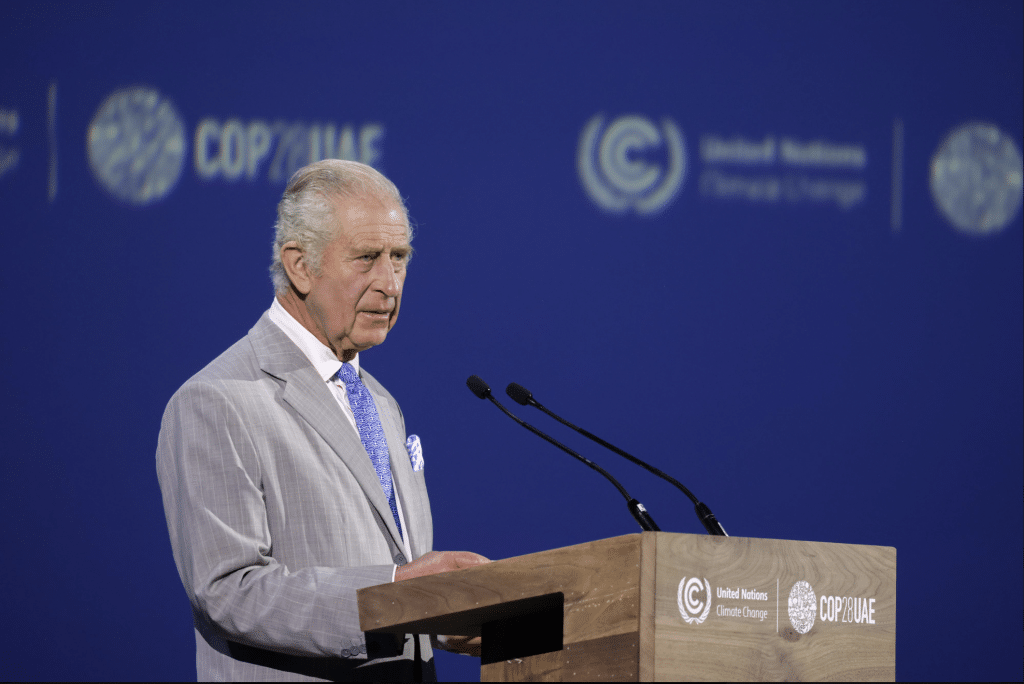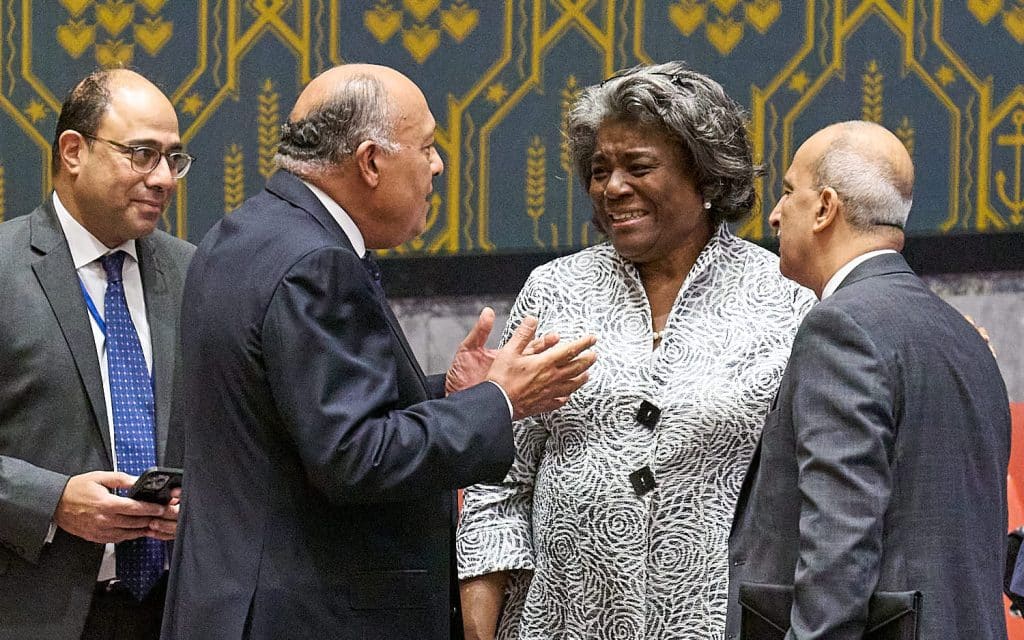
Welcome to This Week @UN, where we summarize the most important news coming from the organization while promoting our own articles that you may have missed in the last seven days. This week, we cover events in the Mideast, with an angle on the UN, as well as controversy over the head of the World Food Program; “peace” overtures in Armenia; the prosecutor for the International Criminal Court; and the UN’s climate conference.
After a desperately needed humanitarian ceasefire in the Israel-Hamas war and the resumption of Israel’s bombing on Gaza on Friday morning, Martin Griffiths, the UN relief chief, said: “Over the past seven days, hostages were released, families were reunited and more patients received some medical care. The volume of aid into and across Gaza increased. And while it barely scratched the surface of what people need, it still allowed aid agencies to provide some basic supplies, reach areas which have been cut off for weeks, and offer some respite to deeply traumatized families.”
Today, he notes, that “in a matter of hours, scores were reportedly killed and injured. Families were told to evacuate, again. Hopes were dashed. Almost two months into the fighting, the children, women and men of Gaza are all terrified. They have nowhere safe to go and very little to survive on. They live surrounded by disease, destruction and death. This is unacceptable. . . . We need the fighting to stop.”
Double your donation to PassBlue: From now until Dec. 31, our annual fund-raising campaign will match all gifts up to $1,000 each. So it’s an irresistible double-your-money deal to declare your support for independent, nonprofit journalism — a mighty category of media — that fearlessly holds truth to power and that has neither corporate overlords nor accepts contributions from governments. In our times, nothing could be more important in preserving democracy than accurate, in-depth reporting.
Follow us on Twitter (X), Facebook, Instagram and LinkedIn.
• Don’t miss a brand-new Substack journal, Spoiler Alerts, where the great Ben Donaldson (ex-UNA-UK) and others take readers behind the scenes of diplomacy and international treaty-making. This week, the debut zeroes in on the gathering at the UN in New York City of states parties to the Treaty on the Prohibition of Nuclear Weapons, affectionately called the TPNW. A diplomat ripped down a poster of Tiananmen Square in an exhibition at the UN this week. Who? See Spoiler Alerts.
Sunday, Nov. 26
• Could the Taliban Join the UN? They’ll Need to End Their ‘Gender Apartheid’ System: Anne Marie Goetz, a former director of the peace and security section at UN Women, analyzes in her opinion piece the possibility of the UN granting a seat to the Taliban, based on a new independent assessment of Afghanistan. The main obstacle preventing the de facto authorities, who took over the country in August 2021, from being formally recognized at the UN is, Goetz writes, “The Taliban’s harsh treatment of women and girls.”
You might be interested in these posts.
[display-posts taxonomy=”category” tax_term=”current” orderby=”date” posts_per_page=”3″ wrapper=”ul” content_class=”pb-inpost-list” wrapper_class=”pb-inpost-layout” exclude_current=”true”]
Monday, Nov. 27
• Armenia Says Peace Is ‘Realistic’ With Azerbaijan but Awaits the Right Signals: Joe Penney writes from Yerevan that two months after Azerbaijan’s blistering takeover of the ethnic-Armenian enclave of Artsakh — also known as Nagorno-Karabakh — Armenia’s deputy foreign minister, Vahan Kostanyan, details his country’s foreign policy, how the UN is helping with the sudden refugee influx from Artsakh/NK and why he thinks peace with Azerbaijan is “realistic.”
• Secretary-General’s press encounter: After visiting Antarctica, Secretary-General António Guterres told reporters that the continent’s sea ice has hit an “all-time low,” measuring at 1.5 million square kilometers smaller than average for this time of year. He said this development “directly endangers lives and livelihoods in coastal communities across the globe” and that without “changing course, we’re heading towards a calamitous three-degree Celsius temperature rise by the end of the century.” Guterres’s trip was timed for COP28, which runs in the United Arab Emirates from Nov. 30 to Dec. 12. Guterres’s message to world leaders: “End the fossil fuel age.” Both United States President Joe Biden and China’s Xi Jinping announced they would be at the conference. (Vice President Kamala Harris is attending in Biden’s place.)
Tuesday, Nov. 28
• Is the ICC Prosecutor Karim Khan Fit for Purpose?: Former UN officials Hasmik Egian and Mouin Rabbani examine in their opinion piece Khan’s actions as prosecutor of The Hague-based International Criminal Court since taking the job in June 2021, particularly criticizing his inaction on Palestine. The authors write: “Karim Khan’s unprecedented politicization of the International Criminal Court . . . has significantly eroded the credibility of the Court just as he should be taking serious steps to address its declining legitimacy.” The essay was reposted on Jadaliyya, a digital magazine published by the Arab Studies Institute.
• Spokesperson’s briefing: The Office for the Coordination of Humanitarian Affairs (Ocha) announced that the first humanitarian shipment of medical and nutritional supplies from Relief International has reached North Darfur’s capital Al Fasher, in Sudan, from Chad on Nov. 26, easing conditions for 185,000 people. UN spokesperson Stéphane Dujarric added that in addition to the “good news in a sea of usually bad news from Sudan,” another convoy of medical supplies reached Central Darfur State on Nov. 23, the first since the civil war broke out in April.

Wednesday, Nov. 29
• The UN’s Yearly Climate Gathering Must Change to Tackle the Planetary Emergency: Maja Groff and Eoin Jackson of the Climate Governance Commission unpack the persistently underwhelming results of the UN’s annual climate conferences since the ratification of the 2015 Paris Agreement, which set the targets the world must meet by 2030 to avoid the worst results of global warming. “UN climate conferences lack sharply focused results and place a heavy emphasis on governmental participation while neglecting to include or hold accountable key players like civil society and businesses,” the essayists write, adding that a “newly restructured governance architecture must be seriously discussed now to culminate at COP30 in 2025 (Paris +10).”
• Spokesperson’s briefing: Guterres briefed the UN Security Council on the status of the recently approved Resolution 2712, which addresses the humanitarian crisis in Gaza, especially the devastation on children, as the number of youngsters killed has hit approximately 6,000 since Oct. 7. Although the UN is “working to maximize the potential” of the recent Qatar, Egypt and US-brokered six-day truce between Israel and Hamas, Guterres emphasized that “the level of aid to Palestinians in Gaza remains completely inadequate to meet the huge needs of more than two million people.” In his own brief, Tor Wennesland, the UN special coordinator for the Middle East peace process, urged the Council not to ignore the “most intensive Israeli operations in the West Bank since the Second Intifada,” as the use of drone strikes and improvised explosive devices, combined with increased settler hostilities, have killed 154 Palestinians, including 37 children, since Oct. 7, he said.
[On Dec. 1, the UN announced that Lynn Hastings, the UN resident/humanitarian coordinator in the Occupied Palestine Territory, or OPT, will not be granted a visa renewal from Israel, which means she may not be able to work in Palestine. Dujarric noted that Hastings had been subjected to “personal” attacks on Twitter as well]
Thursday, Nov. 30
• World Food Program Boss Faces More Rage for Her Actions Amid the Gaza War: Anastasiia Carrier tracks the recent controversy surrounding Cindy McCain, head of the Rome-based World Food Program, since the start of the war in Gaza, and its damning effect on the agency’s morale. Building on a previous scoop by Carrier on the dispute, published on Nov. 20, her follow-up describes extensive criticism voiced toward McCain by regional staffers for her actions related to the war. As one staffer put it: “[We] had neither your presence, nor your action and not even your voice for Gaza.”
[Dujarric told reporters on Dec. 1: “We think Cindy McCain has been doing an excellent job and obviously has the full backing of the Secretary-General. I think both her leadership and what WFP has been doing in Gaza has been exemplary. . . . Ms. McCain has spent a lot of time listening to WFP staff. But I think her statements against this conflict and her efforts to try to increase the access to food of those Palestinians who are under fire, I think, is clear and exemplary.”]
• Spokesperson’s briefing: A General Assembly body has formed a UN intergovernmental committee tasked with creating a framework that aims to “close the perilous gap in SDG financing,” Dujarric said. “Aggressive tax avoidance and tax evasion have a corrosive effect on public trust, financial integrity, the rule of law and sustainable development across the globe,” he added, calling “all Member States to participate in the process” adopted during the Sustainable Development Goals summit in September.
Friday, Dec. 1
• Spokesperson’s briefing: Speaking at the opening ceremony of the World Climate Action Summit at the UN’s COP28, set in the UAE, Guterres highlighted the priorities of the two-week conference: drastic cuts to emissions, the acceleration of a “just and equitable” transition to renewables and climate justice for developing countries. Guterres urged fossil-fuel company leaders not to “double down on an obsolete business model” but instead “[lead] the transition to renewables.”
This post was originally published on this site be sure to check out more of their content.









